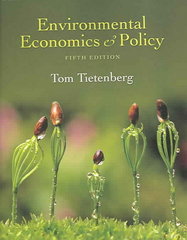Answered step by step
Verified Expert Solution
Question
1 Approved Answer
what is the thesis of this essay? In his 1992 book the end of history and the last man, author Francis Fukuyama argues that with
what is the thesis of this essay? In his 1992 book the end of history and the last man, author Francis Fukuyama argues that with the rise of western neoliberalism and the fall of the soviet union that human history had reached its endpoint, creating the final form of human society. The current state of constant crisis and disaster shows us clearly that this has been proven to be wrong. Neoliberalism is an ideology which Is based on the capitalist logic of production, which means that the economy is entirely based on the movement of goods and services in exchange for money and the constant growth or at least maintenance of profit. This constant expansion of profit, and thus extraction of resources is formed in relation to the (finite) resources of the earth which it uses as its material base. so there is a basic contradiction between the earth and capitalism. This problem is becoming more and more apparent at a rapid pace, causing ecological disaster, wars, poverty, war and so on. A problem that is talked about in surviving progress is soil depletion, modern agriculture (based on capitalism) is based on getting as much product as possible from the land as often as possible. The money from selling that product is then re- invested into the use of the land for agriculture and continue to grow profit, but to grow the product that is being sold, farmers need soil nutrition which only becomes available slowly over time, not at the same speed of the demand for resources(again, based upon the logic of capitalism) this causes the soil to become exhausted. In the 19th century, loss of soil fertility was a problem too, and the soil fertility was recovered through the importation of guano (bird excrement) from Latin America as fertilizer (Peru specifically). It worked very well, so European people began to import and use it in massive quantities, but the problem with this solution was that the exhaustion of resources simply shifted to somewhere else, and after all of the guano was gone(as well as the profits that came with it), the extraction moved to another resource. "solutions" to climate change which are based on maintaining capitalism can just shift the burden somewhere else, without ending the logic of capitalist production (infinite growth) our earth's resources will be exhausted. People always seem to want to hear about solutions first and problems second, without a proper understanding of a problem, its causes and how it functions there is only ignorance in front of us, and all of our solutions are more or less shots in the dark. Its hard to find solutions when our whole way of living is a part of the problem, there has to be a complete transformation of the way that we live in order for both humanity and the earth to survive, the logic of profit needs to end because it creates a massive surplus which is destroying the earth and also threatening the survival of humanity as a whole, this is the solution. So, how do we actually do this? How can we disentangle ourselves from this way of living in a concrete way while still being able to meet people's needs and distribute resources? One idea that Japanese philosopher Kohei Saito brings up is the shortening of the work week, he says that "by reducing the number of hours, we are not only slowing down the growth, but we are also slowing down the production of unnecessary goods and improving the welfare of the working class. These are things that could be more of better satisfied under a socialist regime with degrowth kind of politics. So, the shortening of working hours is good for the environment, good for the well-being of the workers. And they can spend more time on politics, learning new things and spending time with family, friends and doing sports" . if we had a government which opposed capitalism and invested in not only setting up but maintaining better social welfare systems(universal basic income ,housing ,medical care, food) and the work week was decreased, people would
Step by Step Solution
There are 3 Steps involved in it
Step: 1

Get Instant Access to Expert-Tailored Solutions
See step-by-step solutions with expert insights and AI powered tools for academic success
Step: 2

Step: 3

Ace Your Homework with AI
Get the answers you need in no time with our AI-driven, step-by-step assistance
Get Started


